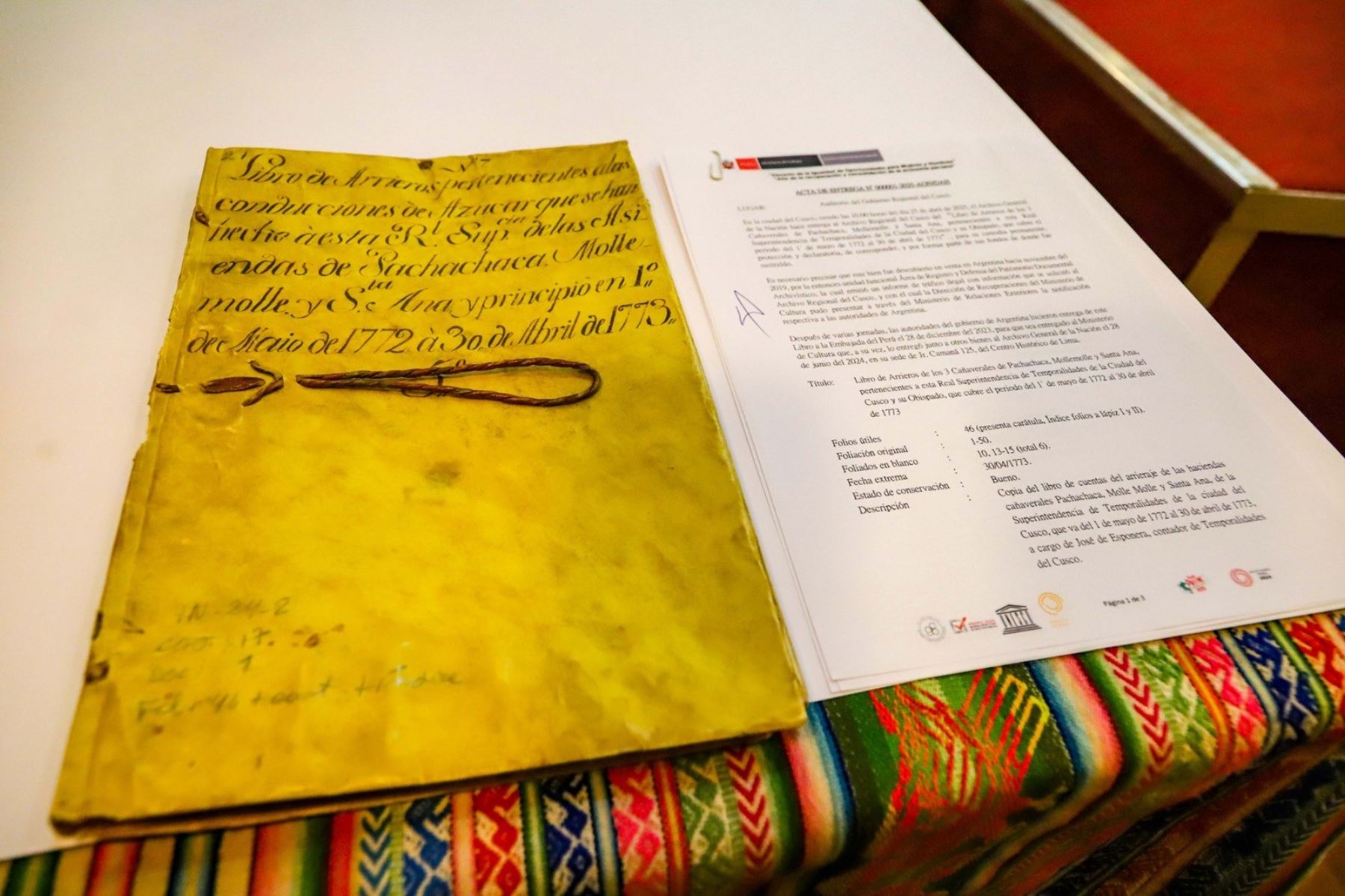A book containing manuscripts dating from May 1, 1772, to April 30, 1773, with records of the work Tupac Amaru II did as a muleteer, which had been stolen from Cusco, was successfully recovered from an auction and repatriated from Argentina.
These manuscripts registered the transport of sugarcane, sugar, and its derivatives made to the Royal Superintendency of the estates of Pachachaca, Mollemolle, and Santa Ana (Apurímac and Cusco), and provides evidence of the work of José Gabriel Condorcanqui known as Túpac Amaru II.
The Regional Government of Cusco, which participated in the recovery process, recently presented the account book of the Superintendency of Temporalities of Cusco, the institution that took charge of the Jesuits' accounts and assets after they were ousted from Peruvian territory.
Under the title “In the Footsteps of Tupac Amaru II,” artistic presentations were show to the academic community, students, researchers, and authorities in attendance. The event was presided over by Governor Werner Salcedo.
Edwin Berduzco, director of the Regional Archive, told Andina News Agency that the recovery process was very difficult.
“We must be realistic, and through the proper channels, the cooperating country, Argentina, must be valued. Through the Ministries of Foreign Affairs and Culture, the manuscript was brought to Peru,” he emphasized.
According to him, the manuscript was likely stolen in 2017 and has been auctioned on the illegal digital market, which prompted intervention by the Argentine police, eventually placing the document under custody.
“It started with a base price of US$5,500, but had already reached US$15,000. An English citizen was about to acquire it on the black market. But thanks to Peru-Argentina jointed efforts, and Governor Werner Salcedo, it was possible to intervene,” he said.
Following the sugar route
Estates like Pachachaca were highly organized agricultural centers, specializing in a single product: sugar. Their function was to supply important urban centers such as Cusco and Potosí.
Muleteers were key players in the operation of sugarcane estates, especially in the transportation of goods and the institutionalization of routes.
An example of the importance of muleteers was Tupac Amaru II, who, as a muleteer, went on to lead the 1780 rebellion. José Gabriel Condorcanqui traveled trade routes between Cusco, Potosí, and other cities, transporting goods like sugar, textiles, and grains.
The muleteer was not only a key worker in economic development but also a privileged witness and potential political actor, as the story of Tupac Amaru II demonstrates, Berduzco emphasized.

Relevant process
The Peruvian Embassy in Argentina reported and coordinated the recovery of the document, which was being illegally auctioned on the virtual market. Bernardo Jesús Reyes Cueva was the first to report in December 2019, the auctioned document, when he was doing his work at the National General Archive.
With provincial fiscal order No. 27-2020 from the Prosecutor’s Office specializing in Crimes Against Cultural Heritage, formal investigations were carried out. It was confirmed that a notebook was indeed missing from File 30 of the Sciences College Collection at the Regional Archive of Cusco.
However, no official reports had been filed about the document’s theft, misplacement, or loan, though the investigation is ongoing and reportedly 70% complete.
In case file No. 710-2021, pursued by the Public Ministry for the crime of illegal extraction of cultural assets, it is stated that the identity of those responsible is unknown, as is how the manuscript went into Argentina.
Thanks to the joint work of Peruvian institutions and the Argentine Federal Police, the important manuscript was recovered.
Prosecutor Claudio Navas and Judge Pablo Yadorola represented Peru in the return and recovery of the historic document. Following that, the Ministry of Foreign Affairs delivered the recovered asset to the Ministry of Culture through diplomatic channels.
The Ministry of Culture returned the manuscript of the Sugarcane Muleteers to the Regional Archive.
More in Andina:
(END) PHS/MAO/JMP/ MDV
Published: 4/30/2025